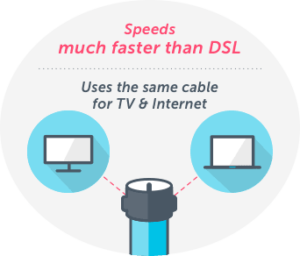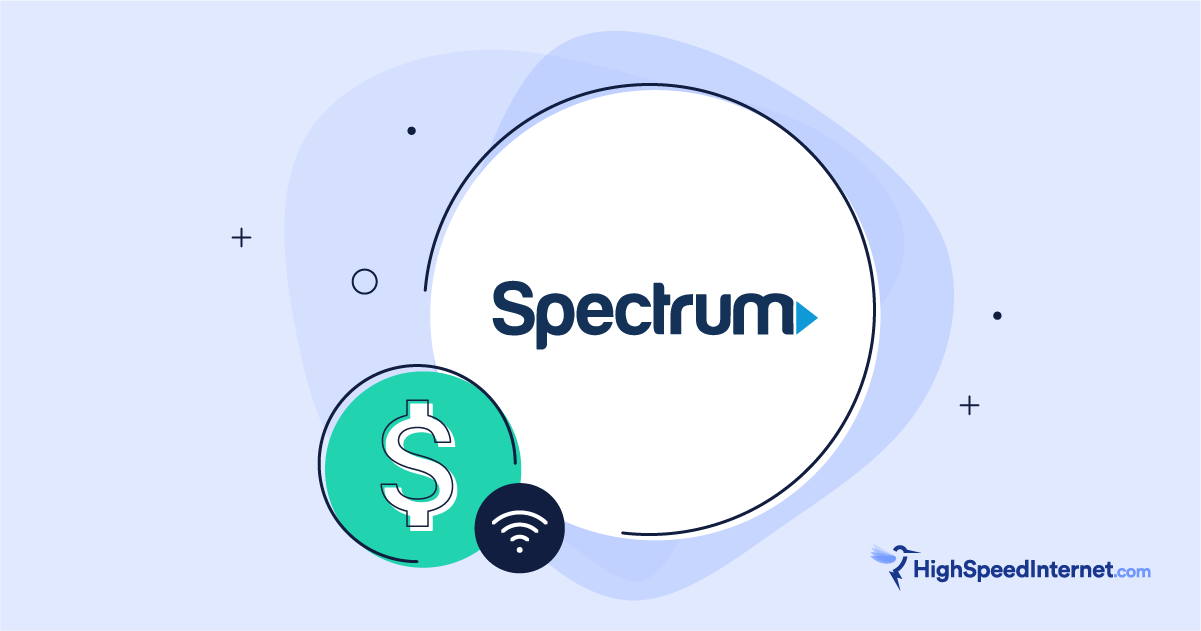What Type of Internet Do You Have at Home?
Feb 13, 2026 | Share
Brand Guides
Internet comes in several different connection types—and the type of connection you have plays a big part in determining how fast, reliable, and costly your internet is.
Fiber internet is the fastest connection you can get, but it’s also the hardest to find. Cable is also reliable and has speeds faster than DSL internet. There’s also 5G internet, a promising and affordable new type of service, but it may be a while before it’s widely available to the public.
So which internet type is best for you?
We put together a guide to help you figure that out. Read on to get all the details of how these types work, how much they cost, and what speeds you can get from each.
And of course, use our zip check tool below to see what type of internet you can get in your area.
What types of internet are available?
| Internet type | Max speed | Price | View all plans online |
|---|---|---|---|
| Fiber | 50,000Mbps (50Gbps) | $25.00–$299.95/mo. | View Plans |
| Cable | 2,000Mbps (2Gbps) | $19.99–$109.99/mo. | View Plans |
| DSL | 140Mbps | $27.99–$69.99/mo. | View Plans |
| 5G | 1,100Mbps (1.1Gbps) | $50.00–$90.00/mo. | View Plans |
| 4G LTE | 9–50Mbps | $40.00–$100.00/mo. | View Plans |
| Fixed wireless | 100Mbps | $39.95–$99.00/mo. | View Plans |
| Satellite | 100Mbps | $30.00–$150.00/mo. | View Plans |
Data as of 12/18/2025. Offers and availability may vary by location and are subject to change.
DSL, fiber, and cable
DSL, fiber, and cable are the most common types of internet services available. They’re the fastest, most accessible, and most affordable connections for the vast majority of internet customers in the United States.
Fixed wireless, including 4G LTE and 5G
Fixed wireless internet service is increasingly popular—and easier than ever to get. The oldest type of fixed wireless networks use radio waves and unlicensed spectrum to deliver home internet within a small area, but new 4G LTE and 5G home internet instead use excess capacity and big, national cellular networks.
Satellite
You can also get satellite internet, which beams an internet signal down from space. It is by far the most available option out there, but it’s more expensive than other internet connections and delivers slower speeds and less data. It’s really something you’d want only if you live in a rural area with limited options.
What is the best type of internet connection?
The best type of internet is fiber-optic internet because it’s extremely efficient, reliable, and fast. Fiber reaches multi-gig speeds for both download and upload speeds. Indeed, fiber delivers the fastest speeds possible out of any internet type—all the way up to 10,000Mbps (though 1,000Mbps is far more common).
However, fiber—which runs on fiber-optic cabling—requires expensive infrastructure to every home, so it’s not available everywhere. If you can’t get it in your area, cable is another excellent internet type. It’s much more readily accessible since it runs on the coaxial wiring provided by large cable companies. The fastest cable internet plans offer 2,000Mbps in download speeds.
Type your zip code to find different types of internet providers in your area:
How to know what type of internet you have
| Internet provider | Connection type | Customer rating* | Order online |
|---|---|---|---|
| DSL, fiber, fixed wireless | 3.9/5 | ||
|
| Cable | 3.9/5 | View Plans for Xfinity |
|
| Cable, fiber | 3.7/5 | View Plans for Spectrum |
|
| Cable, fiber | 3.7/5 | View Plans for Cox Communications |
|
| DSL, fiber, fixed wireless | 3.3/5 | View Plans for EarthLink |
|
| Cable, fiber | 3.3/5 | View Plans for Optimum |
|
| DSL, fiber | 3.6/5 | View Plans for Kinetic |
| DSL, fiber | 3.6/5 | ||
|
| DSL, fiber | 3.5/5 | View Plans for Frontier |
|
| Cable, fiber | 3.6/5 | View Plans for Astound |
|
| Cable | 3.8/5 | View Plans for Sparklight |
|
| Cable | 3.4/5 | View Plans for Xtream Powered by Mediacom |
|
| Fixed wireless | 3.6/5 | View Plans for Rise Broadband |
| Satellite | 3.1/5 | ||
| Satellite | 3.1/5 |
*Ratings based on our annual customer satisfaction survey.
To find out what type of internet service you have, you can ask your internet provider. Most internet providers have one type of internet on their network, or two at most. You can also look at your monthly bill, or just look at the cable that connects your modem to the wall, as we explain in the chart below:
| Internet type | How it’s connected (where the cord plugs in) | Customer rating* | View plans |
|---|---|---|---|
| Fiber | Fiber-optic or Ethernet outlet | 3.9/5.0 | View Plans |
| Cable | Coaxial cable outlet | 3.6/5.0 | View Plans |
| DSL | Phone jack | 3.5/5.0 | View Plans |
| 5G | 5G device or 5G fixed-wireless router | 3.9/5.0 | View Plans |
| 4G LTE | 4G LTE phone/hotspot or 4G fixed-wireless router | 3.9/5.0 | View Plans |
| Fixed wireless | Antenna console | 3.9/5.0 | View Plans |
| Satellite | Satellite dish | 3.4/5.0 | View Plans |
*Ratings based on our annual customer satisfaction survey.
Pro tip:
If you want more info about providers and what types of connections they have, see our guide to comparing internet providers.
Fiber internet
$29.99–$299.95/mo.
Speed: 100–10,000 Mbps
Availability: 39% of US population
Animal likeness: Cheetah
Fiber is truly the fastest, most reliable, and most high-tech internet around. Unlike internet connections like cable and DSL, it doesn’t rely on older or potentially outdated communications infrastructure. Instead, it carries data over light signals through its own spiffy network of fiber-optic cabling.
That makes fiber incredibly powerful and fast, capable of reaching up to 50Gbps (although 1Gbps is far more common, and all you really need). It also lets you take advantage of symmetrical internet speeds. This way you can upload enormous video files, do Zoom video-conferencing, and complete other upload-heavy tasks with fast speeds and no interruptions.
Costs for fiber plans are comparable to what you’ll find for cable internet plans, but generally more expensive than fixed wireless. They’re a much better deal than satellite, though, where you pay a lot for speeds that aren’t so reliable.
 Pros:
Pros:
- Efficient connections
- Symmetrical upload and download speeds
 Cons:
Cons:
- Less availability
- Higher prices
What are the best fiber internet plans?
| Provider | Plan | Speed | Price | Sign up |
|---|---|---|---|---|
| AT&T | Internet 300* | 300 Mbps | $55.00/mo.* | |
| CenturyLink | Simply Unlimited Fiber Internet up to 940 Mbps | Up to 940 Mbps | $75.00/mo.** |
*Price after $5/mo Autopay & Paperless bill discount (w/in 2 bills). Plus taxes & fees. Monthly State Cost Recovery Charge in TX, OH, NV applies. One time install chrg may apply. Ltd. avail/areas. Call or go to www.fiber.att.com to see if you qualify.
**Limited availability. Service and rate in select locations only. Paperless billing required. Taxes and fees apply.
Cable internet
$19.99–$109.99/mo.
Speed: 25–2,000 Mbps
Availability: 89% of US population
Animal likeness: Horse
Cable internet is reliable, fast, and pretty much ubiquitous. Most cable internet providers now use fiber in their core network but keep coax cables in place for the “last mile” due to cost.
Believe it or not, the technology is capable of 10,000Mbps (10Gbps) download speeds, but the fastest plan you’ll find right now is 2,000Mbps.
In some cases, cable internet can slow down during peak hours since your service draws from a neighborhood-wide network. Cable also tends to feature regular price hikes, so your bill can go up after a year or two of service. But cable companies are usually game to negotiate, so don’t be afraid of calling up your provider and asking for a promotional hookup if it’s time for your bill to go up.
 Pros:
Pros:
- Fast speeds
- Frequent promo offers
 Cons:
Cons:
- Possible contract requirements
- Possible data caps
What are the best cable internet plans?
| Provider | Plan | Speed | Price | Sign up |
|---|---|---|---|---|
| Xfinity | 500Mbps | 500Mbps | $55/mo.* | View Plans for Xfinity |
| Spectrum | Spectrum Internet Premier w/ Spectrum Advanced | Up to 500Mbps (wireless speeds may vary) | $60/mo.† for 12 mos. | View Plans for Spectrum |
*Pricing and plan names may vary by region. For 12 month, no term contract. Taxes and equipment not included. Incl. up to $10/mo. auto-pay & paperless bill discount.
† Limited time offer; subject to change; new residential customers only (no Spectrum services within past 30 days) and in good standing with Spectrum. Taxes and fees extra in select states. SPECTRUM INTERNET: Standard rates apply after promo period. Additional charge for installation. Speeds based on wired connection. Actual speeds (including wireless) vary and are not guaranteed. Gig capable modem required for Gig speed. For a list of Gig capable modems, visit spectrum.net/modem. Services subject to all applicable service terms and conditions, subject to change. Not available in all areas. Restrictions apply.
DSL internet
$27.99–$69.99/mo.
Speed: 0.5–140 Mbps
Availability: 88% of US population
Animal likeness: Tortoise
Instead of photons zooming through fiberglass or signals beaming across the latest telecom protocols, DSL internet carries data over the old-school wiring of a landline phone network. That makes DSL many times slower than cable or fiber—and the signal gets even weaker as you get farther away from the main network.
But if you can get 25 Mbps on DSL or faster in your area, you’re pretty much good to go. You won’t be able to rely on it for uploading terabyte-sized film projects to YouTube or doing Netflix movie marathons in 4K resolution. But you can still stream in HD, surf social media, and do plenty of other stuff with minimal issues as long as you live in a small household.
DSL used to be available everywhere, but network upgrades are replacing old phone cables with new fiber ones. In most cases, we’d recommend fiber or fixed wireless instead anyway.
 Pros:
Pros:
- Wide availability
- Straightforward pricing
 Cons:
Cons:
- Slower speeds
- Inconsistent performance depending on area
What are the best DSL internet plans?
| Provider | Plan | Speed | Price | Sign up |
|---|---|---|---|---|
| CenturyLink | Simply Unlimited Internet up to 140 Mbps | Up to 140 Mbps | $55.00/mo.* | |
| EarthLink | 75 Mbps Internet | Up to 75 Mbps | $64.95/mo.** | View Plans for EarthLink |
*Paperless billing or prepay required. Additional taxes, fees, and surcharges apply. Get the fastest internet speed available at your location (max speed is up to 140 Mbps).
**with a 12 month contract. Actual speeds may vary depending on the distance, line-quality, phone service provider, and number of devices used concurrently. All speeds not available in all areas. DSL and Fiber Plans require a 12 month contract and may have a cancellation fee to be determined upon cancellation
5G internet
$50–$90/mo.
Speed: 40–1,100 Mbps
Availability: Very limited (technology still emerging)
Animal likeness: Unicorn
5G is built on the latest generation of wireless technology, which promises superspeeds of 2,000 Mbps and faster with minimal buffering. The technology works best in densely populated areas, so 5G rollouts are mostly focused around towns and cities.
 Pros:
Pros:
- Decent speeds
- Affordable, straightforward pricing
 Cons:
Cons:
- Limited availability
- Congestion-related slowdowns
What are the best 5G internet plans?
| Provider | Plan | Speed | Price | Sign up |
|---|---|---|---|---|
| T-Mobile | Rely Home Internet | Up to 318Mbps | $50/mo.* w/ AutoPay, plus taxes & fees. | View Plan for T-Mobile Home Internet |
| T-Mobile | Amplified Home Internet | Up to 498Mbps | $60/mo.* w/ AutoPay, plus taxes & fees. | View Plan for T-Mobile Home Internet |
| T-Mobile | All-In Home Internet | Up to 498Mbps | $70/mo.* w/ AutoPay, plus taxes & fees. | View Plan for T-Mobile Home Internet |
| Verizon | Verizon 5G Home Internet | Up to 1,000Mbps | $50–$75/mo.† | View Plans for Verizon Home Internet |
* Guarantee exclusions like taxes and fees apply.
† Price per month with Auto Pay & without select 5G mobile plans. Consumer data usage is subject to the usage restrictions set forth in Verizon’s terms of service; visit: https://www.verizon.com/support/customer-agreement/ for more information about 5G Home and LTE Home Internet or https://www.verizon.com/about/terms-conditions/verizon-customer-agreement for Fios internet.
4G LTE internet
$40.00–$100.00/mo.
Speed: 9–50 Mbps
Availability: Limited (technology still emerging)
Animal likeness: Turtledove
4G LTE internet gives you a Wi-Fi connection over a 4G wireless network. It’s what you get when you use the internet data on your phone or a mobile hotspot, or if you have a fixed wireless internet connection in areas that can’t get 5G.
Speeds can be inconsistent because they depend on where you are in relation to the nearest cell tower, but there are perks. Prices are low, and it may be available where cable and fiber aren’t. 4G LTE is an excellent alternative to satellite internet, since it gives you faster speeds and, in most cases, unlimited data.
 Pros:
Pros:
- Available in remote areas where 5G isn’t
- Faster than satellite internet (and has more data too)
 Cons:
Cons:
- Slower than fiber and cable internet
- Available only in areas with excess cellular capacity
What are the best 4G LTE internet plans?
| Provider | Plan | Speed | Price | Sign up |
|---|---|---|---|---|
| Verizon | Verizon LTE Home Internet | 25-50Mbps** | $60/mo. | View Plans for Verizon Home Internet |
| T-Mobile | T-Mobile LTE Home Internet | 50Mbps | $50/mo. | View Plan for T-Mobile Home Internet |
*Data as of 12/18/2025. Offers and availability may vary by location and are subject to change.
**Price per month without auto pay & mobile plans. LTE Home Internet options not available in all areas. Pricing is subject to change, plan includes taxes & fees. Consumer data usage is subject to the usage restrictions set forth in Verizon’s terms of service; visit: https://www.verizon.com/support/customer-agreement/ for more information about 5G Home and LTE Home Internet or https://www.verizon.com/about/terms-conditions/verizon-customer-agreement for Fios internet.
Fixed wireless internet
$39.95–$99.00/mo.
Speed: 5–100 Mbps
Availability: 46% of US population
Animal likeness: Pigeon
Old-fashioned fixed wireless technology delivers internet over radio signals beamed to an antenna console that you install in your home. It’s not a particularly common internet type, but it does come in handy in cities with bad internet service and in rural areas where your only other option is satellite internet, which tends to be slower and cost more.
That said, fixed wireless internet will still give you slower speeds and less data for the money compared to cable, DSL, and fiber providers. You’ll likely also have limitations when it comes to monthly data usage. But fixed wireless is usually offered by smaller internet providers, so that means you can get more personalized customer service experience.
 Pros:
Pros:
- Great rural option
- Cheaper than satellite internet
 Cons:
Cons:
- Limited coverage
- Monthly data caps
What are the best fixed wireless internet plans?
| Provider | Speed | Price* | Sign up |
|---|---|---|---|
| Rise Broadband | Up to 50Mbps | $79.95/mo. (with autopay discount) or $75.00/mo. (without autopay) | View Plans for Rise Broadband |
| AT&T Internet Air | 75–225Mbps | $60.00/mo.† |
| Provider | Rise Broadband |
| Speed | Up to 50Mbps |
| Price* | $79.95/mo. (with autopay discount) or $75.00/mo. (without autopay) |
| Sign up | View Plans for Rise Broadband |
| Provider | AT&T Internet Air |
| Speed | 75–225Mbps |
| Price* | $60.00/mo.† |
| Sign up |
*Data as of 12/18/2025. Offers and availability may vary by location and are subject to change.
† $60/mo after $5 discount when enrolled in Autopay. Paperless billing req’d. Not available in NY. Monthly State Cost Recovery Charge in TX, OH, NV applies. . Service subj. to Internet Terms of Service at att.com/internet-terms. Offers may be modified, or discontinued, at any time without notice. Other conditions may apply to all offers. Speeds based on wired connection. Actual speeds may vary. For more info, go to www.att.com/speed101.
Satellite internet
$49.99–$299.99/mo.
Speed: 15–100 Mbps
Availability: 100% of US population
Animal likeness: Space monkey
Satellite internet works by beaming a signal down from satellites in space. That means you can get satellite internet basically anywhere in the US. But it also means your internet will be fairly slow because your signal has to travel literally to space and back again—a distance that could span up to 1,200 miles one way—to reach your computer, tablet, or phone.
Satellite internet could get a lot more spectacular in the near future as companies like SpaceX race to launch LEO (low-Earth orbit) satellites into the cosmos to provide improved speeds and reduced latency. Until then, we recommend satellite internet as a fallback if you can’t get any other type of internet service.
 Pros:
Pros:
- Nationwide availability
- Potential for growth with new tech
 Cons:
Cons:
- Slow speeds and high latency
- Low data limits
What are the best satellite internet plans?
| Provider | Plan | Speed | Price | Sign up |
|---|---|---|---|---|
| Starlink | Residential | UP to 400Mbps | $120/mo. | View Plans for Starlink |
| Hughesnet | Fusion | 100Mbps (stated speeds are not guaranteed) | $94.99/mo.* for first 12 mos. | |
| Viasat | Viasat Unleashed | Up to 150Mbps | $119.99/mo.** |
| Provider | Starlink |
| Plan | Residential |
| Speed | UP to 400Mbps |
| Price | $120/mo. |
| Sign up | View Plans for Starlink |
| Provider | Hughesnet |
| Plan | Fusion |
| Speed | 100Mbps (stated speeds are not guaranteed) |
| Price | $94.99/mo.* for first 12 mos. |
| Sign up |
| Provider | Viasat |
| Plan | Viasat Unleashed |
| Speed | Up to 150Mbps |
| Price | $119.99/mo.** |
| Sign up |
Data as of 12/18/2025. Offers and availability may vary by location and are subject to change.
*Minimum term required and early service termination fees apply. Monthly Fee reflects the applied $5 savings for ACH enrollment. Offer may vary by geographic area.
**Prices, speeds and availability vary by location. Prices are subject to change. No annual contract or installation fees are required. Monthly equipment lease fees and taxes may apply.
FAQ about internet types
What is the best internet type for my home?
Can you use Wi-Fi without service?
What type of internet connection do I have?
What is the most common type of internet connection?
How do I know my internet connection type?
Author - Peter Holslin
Peter Holslin has more than a decade of experience working as a writer and freelance journalist. He graduated with a BA in liberal arts and journalism from New York City’s The New School University in 2008 and went on to contribute to publications like Rolling Stone, VICE, BuzzFeed, and countless others. At HighSpeedInternet.com, he focuses on covering 5G, nerding out about frequency bands and virtual RAN, and producing reviews on emerging services like 5G home internet. He also writes about internet providers and packages, hotspots, VPNs, and Wi-Fi troubleshooting.
Editor - Cara Haynes
Cara Haynes has been editing and writing in the digital space for seven years, and she's edited all things internet for HighSpeedInternet.com for five years. She graduated with a BA in English and a minor in editing from Brigham Young University. When she's not editing, she makes tech accessible through her freelance writing for brands like Pluralsight. She believes no one should feel lost in internet land and that a good internet connection significantly extends your life span.










